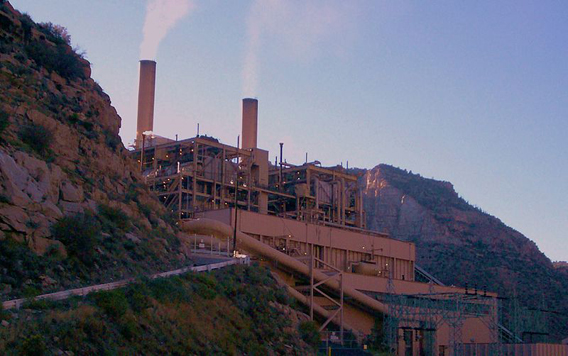
Coal-powered Castle Gate Power Plant in Ohio. Photo by: David Jolley.
A new analysis finds that 21 wealthy countries spent five-times more on subsidizing fossil fuels in 2011 than they have on providing funds for poor nations to cut greenhouse gas emissions and adapt to the impacts of climate change. The analysis, by Oil Change International, comes in the midst of the current UN Climate Summit held in Doha, Qatar; progress at the talks has been stymied due to the gulf between poor and rich nations, including on the issue of climate financing.
“What this analysis shows is that governments gathered in Doha to supposedly fight climate change need to put their money where their mouths are,” said Stephen Kretzmann, Executive Director of Oil Change International. “It should be plainly obvious that you can’t solve a problem when you’re spending vastly more to continue creating it than you are to fix it.”
According to the analysis 21 wealthy countries—including the U.S., Australia, Canada, Japan, and the UK—spent $58.7 billion on subsidizing fossil fuels, while they pledged $11.2 billion in “fast start” funding for poor countries to combat climate change. Rich nations have pledged to boost such funding to $100 billion a year by 2020, but have not outlined how they would pay for it—another contention at Doha this week.
The country with the highest financial support for fossil fuel subsidies was the U.S., which spent $13.1 billion on them in 2011, according to the analysis. In contrast, it put only $2.5 billion in the climate funds. The U.S. is the world’s largest historical contributor to global climate change, and remains the second largest emitter today after China.
Of the 21 countries analyzed by Oil Change International, only Japan’s climate financing was significantly higher than its fossil fuel subsidies.
The need to cut fossil fuel subsidies was agreed on by G-20 countries in 2009, but since then fossil fuel subsidies have actually increased, not fallen.
Yesterday, Ban Ki-moon, Secretary General of the UN, told governments at Doha that, “No one is immune to climate change—rich or poor. It is an existential challenge for the whole human race—our way of life, our plans for the future. We must take ownership. We, collectively, are the problem. Then we should have the solutions.”
Related articles
Fossil fuel subsidies going in the wrong direction?
(10/05/2011) In 2009, G20 nations committed to phasing out fossil fuel subsidies over the medium term, yet are further away today than they were two years ago from keeping the pledge. According to the International Energy Agency (IEA) fossil fuel subsidies rose by nearly $100 billion in the last year alone, from $312 billion in 2009 to $409 billion in 2010. The agency warned that subsidies could reach $660 billion by 2020 if governments don’t act on reform.
2% GDP could turn global economy green
(02/21/2011) Investing around $1.3 trillion, which represents about 2% of the world’s gross domestic product (GDP), into ten sectors could move the world economy from fossil-fuel dependent toward a low carbon economy, according to report by the UN Environment Program (UNEP). In addition, the investments would alleviate global poverty and keep stagnating economies humming, while cutting humanity’s global ecological footprint nearly in half by 2050 even in the face of rising populations.

(12/03/2012) Global carbon dioxide (CO2) emissions from industrial sources are set to hit a new record high this year according to a new analysis by Global Carbon Project. The analysis in Nature Climate Changes predicts that CO2 emissions will rise another 2.6 percent, hitting 35.6 billion tonnes. The scientists warn that such steep climbs in global emissions year-after-year means that the door is rapidly closing on a global agreement to keep temperatures from rising 2 degree Celsius (3.6 degrees Fahrenheit) above pre-industrial levels.
Hopes pinned on Obama again as Doha Climate Summit opens

(11/26/2012) A number of observers have expressed hope that the Obama Administration, fresh from a re-election victory in the U.S., will take a more active and ambitious role at this year’s UN Climate Summit, held in Doha, Qatar. The summit opens amid fresh—and increasingly dire—warnings over climate change from the World Bank, the International Energy Agency, and the UN itself.
As Doha Climate Summit kicks off, more ambitious cuts to greenhouse gas emissions needed
(11/26/2012) As the 18th meeting of the UN Framework Convention on Climate Change (UNFCCC) kicks off this morning in oil and gas rich Qatar, the world body warns that much more ambitious greenhouse gas cuts are needed to keep catastrophic climate change at bay. A new report by the UN Environment Program (UNEP) and the European Climate Foundation finds that even if all current emissions pledges are kept, the world will still spew 8 billion tonnes of CO2 equivalent above what is needed by 2020, putting the globe on a fast-track to dangerous climate change.
World Bank: 4 degrees Celsius warming would be miserable

(11/20/2012) A new report by the World Bank paints a bleak picture of life on Earth in 80 years: global temperatures have risen by 4 degrees Celsius spurring rapidly rising sea levels and devastating droughts. Global agriculture is under constant threat; economies have been hampered; coastal cities are repeatedly flooded; coral reefs are dissolving from ocean acidification; and species worldwide are vanishing. This, according to the World Bank, is where we are headed even if all of the world’s nations meet their pledges on cutting greenhouse gas emissions. However, the report also notes that with swift, aggressive action it’s still possible to ensure that global temperatures don’t rise above 4 degrees Celsius.
Obama criticized for lack of urgency on climate change
(11/15/2012) Following the devastation wrought by Hurricane Sandy—which many scientists say was likely worsened by climate change—and a long silence on the issue of global warming during the Presidential campaign, environmentalists yesterday were disappointed when re-elected President Barack Obama seemingly put action on climate change on the back burner.